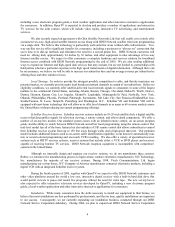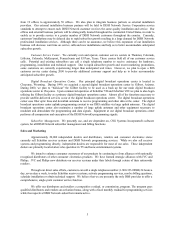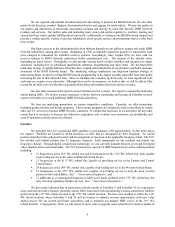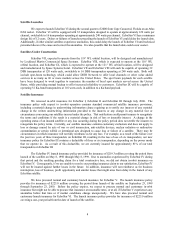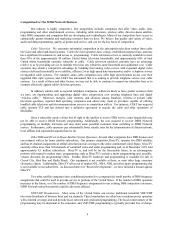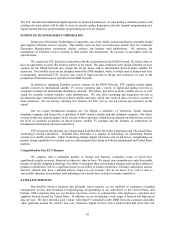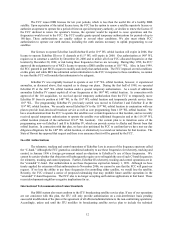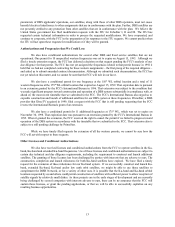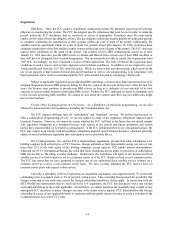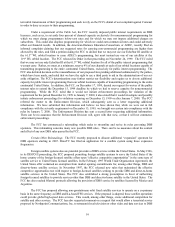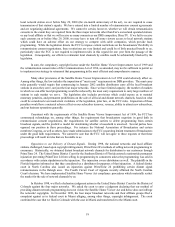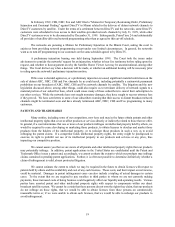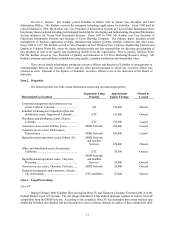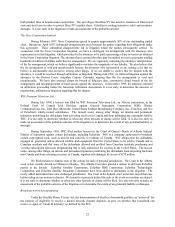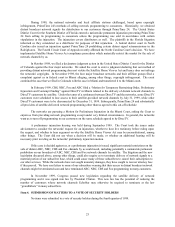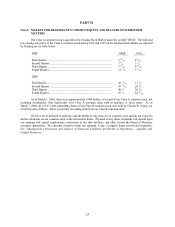Dish Network 1999 Annual Report Download - page 16
Download and view the complete annual report
Please find page 16 of the 1999 Dish Network annual report below. You can navigate through the pages in the report by either clicking on the pages listed below, or by using the keyword search tool below to find specific information within the annual report.14
Regulations
DBS Rules. Once the FCC grants a conditional construction permit, the permittee must proceed with due
diligence in constructing the system. The FCC has adopted specific milestones that must be met in order to retain the
permit, unless the FCC determines that an extension or waiver is appropriate. Permittees must file semi-annual
reports on the status of their due diligence efforts. The due diligence milestones require holders of conditional permits
to complete contracting for construction of their systems within one year of grant of the permit. Additionally, the
satellites must be operational within six years of grant. For permits issued after January 19, 1996, permittees must
complete construction of the first satellite in their system within four years of grant of the permit. The FCC also may
impose other conditions on the grant of the permit. The holders of new DBS authorizations issued on or after
January 19, 1996 must also provide DBS service to Alaska and Hawaii from at least one of their DBS satellites or
they will have to relinquish their western assignments. We are presently not able to satisfy this requirement from
148° WL. Accordingly, we have requested a waiver of that requirement. The state of Hawaii has requested many
conditions to such a waiver, and we have opposed several of these conditions. In addition, we are required to serve
Alaska and Hawaii from the 110° WL orbital location. While we believe that our current plan, which involves the
use of our capacity at that location for local-into-local broadcast as well as core programming, is in compliance with
that requirement, there can be no assurance that the FCC will consider this plan as complying with the rule.
Subject to applicable regulations governing non-DBS operations, a licensee may make unrestricted use of its
assigned frequencies for non-DBS purposes during the first five years of the ten-year license term. After the first five
years, the licensee may continue to provide non-DBS service as long as it dedicates at least one-half of its total
capacity at a given orbital location to providing DBS service. Further, the FCC indicated its desire to streamline and
revise its rules governing DBS satellites. We cannot be sure about the content and effect any new DBS rules might
have on our business.
Certain Other Communications Act Provisions. As a distributor of television programming, we are also
affected by numerous laws and regulations, including the Communications Act.
The FCC imposes different rules for “subscription” and “broadcast” services. We believe that because we
offer a subscription programming service, we are not subject to many of the regulatory obligations imposed upon
broadcast licensees. However, we cannot be certain whether the FCC will find in the future that we should comply
with regulatory obligations as a broadcast licensee with respect to our current and future operations, and certain
parties have requested that we be treated as a broadcaster. If the FCC determined that we are a broadcast licensee, the
FCC may require us to comply with all regulatory obligations imposed upon broadcast licensees, which are generally
subject to more burdensome regulation than subscription service providers like us.
The Communications Act, and the FCC’s implementing regulations, provide that when subsidiaries of a
holding company hold certain types of FCC licenses, foreign nationals or their representatives may not own or vote
more than 25% of the total equity of the holding company, except upon an FCC public interest determination.
Although the FCC’s International Bureau has ruled that these limitations do not apply to providers of subscription
DBS service like us, the ruling is under challenge. Furthermore, the limitations will apply to our licenses for fixed
satellite service if we hold ourselves out as a common carrier or if the FCC decides to treat us as a common carrier.
The FCC has noted that we have proposed to operate one of our authorized fixed satellite service systems on a
common carrier as well as a non-common carrier basis. We have recently informed the FCC that we have no
common carrier plans with respect to that system.
Currently, a subsidiary of News Corporation, an Australian corporation, owns approximately 7% of our total
outstanding class A common stock or 1% of our total voting power. This ownership has increased the possibility that
foreign ownership of our stock may exceed the foreign ownership limitations, if they apply. In connection with the
MCI WorldCom authorization that we received in the 110 acquisition, the FCC has decided to waive any foreign
ownership limitations to the extent applicable. Nevertheless, we cannot foreclose the possibility that, in light of any
subsequent FCC decisions or policy changes, we may in the future need a separate FCC determination that foreign
ownership in excess of any applicable limits is consistent with the public interest in order to avoid a violation of the
Communications Act or the FCC’s rules.


